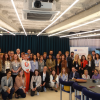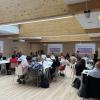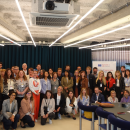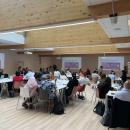Highlights from the 2025 Annual Meeting of National Coalitions and DSJP: a resilient and skilled Europe in a changing world
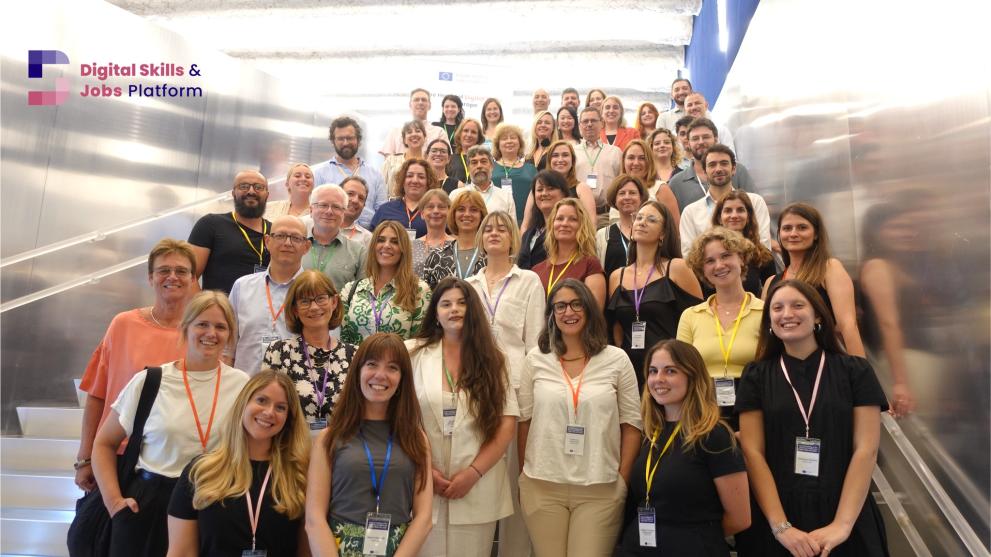
At the start of every summer since the official launch of the Digital Skills & Jobs Platform, National Coalitions (NCs) for Digital Skills & Jobs in the EU Member States travel to Brussels for an in-person co-creation meeting and workshop. This year was no different, but the difficulty level was raised to advanced as Brussels recorded a code orange and a heatwave with one of the highest temperatures measured ever on 1 July. Yet, as Belgians flocked to to nearby beaches and smaller seaside towns, National Coalitions for Digital Skills and Jobs braved the sweltering hot weather and travelled to Brussels to meet representatives of the European Commission, HaDEA, the European Health and Digital Executive Agency, and the Digital Skills & Jobs Platform team.
National Coalitions as the lifeline of the Digital Skills & Jobs Platform
Met with hot (and cold!) coffee and a breakfast to start the day off right, National Coalitions were welcomed by Vitis Faure Tilgaard (DG CNECT, European Commission) and Sabrina Vorbau, Project Manager of the Digital Skills & Jobs Platform (European Schoolnet). A special video message by Rehanna Schwinninger-Ladak, Deputy Director and Head of Unit for Interactive Technologies, Digital for Culture and Education in DG Connect at the European Commission, recorded ahead of the meeting, also served to kick off the meeting, delving into some of the most pressing challenges ahead of the EU, and highlighting the crucial role of National Coalitions in Europe - the lifeline of the Digital Skills & Jobs Platform, and the engine of practical initiatives around digital skills in Europe.
National Coalitions’ achievements have been central to progress against the 2030 targets of the Digital Decade, and this is recognised in the 2025 State of the Digital Decade report - which also sees Europe standing at a crucial crossroads. The Digital Skills & Jobs Platform recently welcomed 2 new NCs to the digital skills and jobs home - Estonia and Germany. Other achievements in the last few years of the European DSJ Platform include:
- Over 16.000 community members and more than 21.000 monthly visits;
- Over 3.100 content items published on the Platform, helping to bridge the gap between skills and talent.
- Successful organisation of an Information Day for the EU digital skills academies, with over 400 participants.
- 14 Digital Skills Talks and over 30 experts interviewed.
Still time for NCs to apply for funding: C4DD's FSTP mechanism
Within the framework of the recently launched “Champions for the Digital Decade” (C4DD) project, funded via the Digital Europe Programme of the European Union, there is an open call for Financial Support for Third Parties, which boosts funding for both new and existing NCs as potential beneficiaries. The deadline for applications on 31 August 2025 and National Coalitions can apply for the funding offered by the Call via here.
Union of Skills: what's in it?
Launched in 2025 as a holistic vision for skills at all levels (both basic and advanced), the Union of Skills is a strategic initiative alongside the EU Competitiveness Compass and the Clean Industrial Deal. Michael Horgan, DG EMPL of the European Commission presented the latest challenges, stemming from data gathered as part of the Union of Skills Strategy.
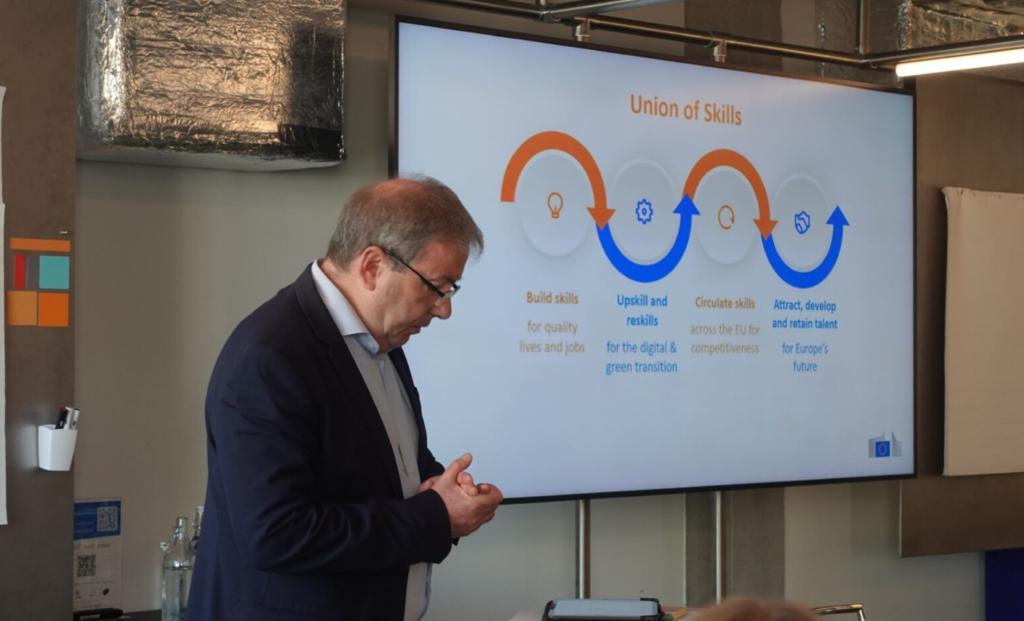
Skills shortages in Europe loom large, with 42 occupations identified as shortages in 2023. At the same time, close to two-thirds of SMEs in continue to report difficulties in finding the right talent. A little less than half of the EU's population still lacks even basic digital skills. To remedy this, three objectives underpin The Union of Skills strategy 1) everyone should feel empowered to develop skills with strong foundations, 2) companies should be able to find the right talent, and 3) skills should be transparent, trusted and recognised – a new single market of skills, as suggested by Mario Draghi in his report on EU Competitiveness.
An upcoming update to EC’s Dig Comp framework is also being shaped along: update to proficiency levels, learning outcomes, further integration of AI competence and update of wording of competence and skills areas. Other future initiatives include a pilot guarantee for workers, the roll-out of targeted EU academies for specialised skills, building transnational university – industry partnerships in sectors experiencing severe skills shortages and gaps, expanding the use of micro-credentials, reinforcing the Pact for Skills, supporting the implementation of Individual Learning Accounts and others.
Interactive session with the European Commission
Next on the agenda of the Annual Meeting between NCs and the Digital Skills & Jobs Platform included an interactive networking session with the European Commission, represented by Vitis Faure Tilgaard from DG Connect, Interactive Technologies, Digital for Culture and Education unit. The session gave an opportunity for NC representatives to engage directly with the Commission, exchange ideas, ask questions and share feedback, and explore further synergies across national and EU dimensions.
Co-creation workshop sessions with NCs
To wrap up the day, National Coalitions for Digital Skills & Jobs spent the afternoon diving into specific group sessions on the following topics: 1) Advanced learning, upskilling and reskilling; 2) Advanced Digital Skills in Education; 3) Cyber-ready workforce; 4) Girls and Women in ICT and 5) Flexible learning solutions and skills transparency. Each group had 1 hour to identify the 2 most pressing challenges, propose 2 concrete solutions, and 2 actionable steps to address said challenges - before presenting the main highlights in front of the whole group.
Want to know more?
National Coalitions for Digital Skills & Jobs are an integral part of the Digital Skills & Jobs Platform. They regularly publish news, resources, updates, and trainings and are part of the Digital Skills & Jobs Community. Discover national strategies for bridging the digital skills divide, news from all over the EU Member States, and much more.

